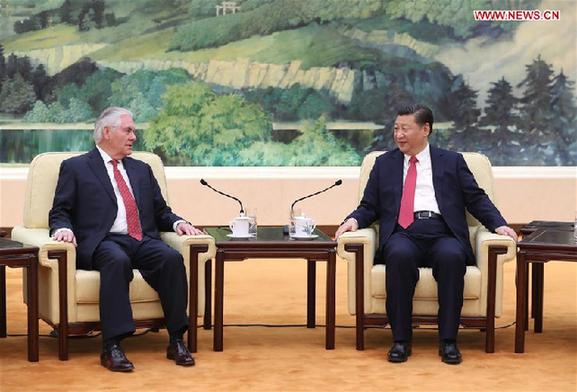Tillerson's visit and Sino-US ties
china.org.cn / chinagate.cn by Sajjad Malik, March 22, 2017 Adjust font size:
|
|
|
Chinese President Xi Jinping (R) meets with U.S. Secretary of State Rex Tillerson at the Great Hall of the People in Beijing, capital of China, March 19, 2017. (Xinhua/Ju Peng) |
U.S. Secretary of State Rex Tillerson made his first visit to China since he assumed office last month. He had crucial interactions with top leadership, including a meeting with President Xi Jinping on Sunday in the Great Hall of People.
Earlier, Mr. Tillerson also had separate meetings with Chinese State Councilor Yang Jiechi and Foreign Minister Wang Yi on Saturday.
The statements, body language and media reports show that Mr. Tillerson's trip was successful as it helped to blunt the recent rhetoric and shift the focus on the challenges confronting the two biggest economies of the world.
The meeting with President Xi was unique opportunity for Mr. Tillerson to get the essence of China's policy and expectations. Xi was quite forthcoming in the conversation and said that two countries needed to increase "strategic trust and mutual understanding."
He also suggested that it was time to review bilateral ties from long-term and strategic perspectives and expand fields of cooperation for win-win outcomes.
President Xi also revealed that he had been in touch with the U.S. counterpart Donald Trump through telephone calls and messages. He called it maintaining "sound communication." His emphasis was to have a system to "address and manage sensitive issues" which can derail the ties.
Xi also extended welcome to President Trump for a visit. Mr. Tillerson responded positively by saying that President Trump valued communication with President Xi and looked forward to meeting Xi and the opportunity for a visit to China.
The atmosphere of the meeting reflected mutual desire to understand each other. The important message from the Secretary of State was that his country wants a relationship based on the principles of "no conflict, no confrontation, mutual respect and win-win cooperation."
I think that the crux of the visit was to move the relationship forward with a new vigor. The message from China was also clear and resounding that friction is not in the interest of anyone and cooperation was need of the hour.
In the delegation level talks, Foreign Minister Wang Yi said that the two sides were in close contact to organize the first ever summit meeting of the two presidents. "We have in-depth discussions on arranging a recent meeting between two presidents and starting relevant preparations," Wang said.
The two sides might have worked on the details and possible agenda points of the summit meeting, which will bring the two presidents together after their first direct conversation on telephone in February when Mr. Trump called the Chinese leader after tension over a call from Taiwanese leader, which spotlighted American ambivalent attitude towards one-China policy. Mr. Tillerson's visit was an assertion that the United States was sticking to the old policy, which was momentarily in jeopardy.
As trade and commercial activities form an integral part of Sino-U.S. ties, Mr. Tillerson should have used the opportunity to discuss the areas of concerns and differences. The two economies had yearly trade worth 579 billion dollars in 2016, roughly accounting for almost a quarter of the world's total trade. China has a surplus of 347 billion dollars, which irks Mr. Trump. But Tillerson avoided publicly discussing trade and currency issues.
Given the huge trade volume between the two countries, none of them is in a position to damage the economic ties. The imbalances and differences can be addressed. Mr. Tillerson, who is the former CEO of ExxonMobil, can understand the importance of economic matters in addition to the finer parts of politics and security.
Another positive aspect of the visit was that bilateral differences were not played up for the gallery. The two sides have conflicting viewpoints on several matters but did not allow them to override the positive side of the relations.
The first visit by the top Trump aide was successful as it was focused on cooperation and future interactions. The trip should have opened new channels for consultation on all matters of concern. The important part is that it has reset the unsettled ties. Now all efforts should be made to make the upcoming summit successful.
Sajjad Malik is a columnist with China.org.cn. For more information please visit:
http://www.china.org.cn/opinion/SajjadMalik.htm
Opinion articles reflect the views of their authors, not necessarily those of China.org.cn.
